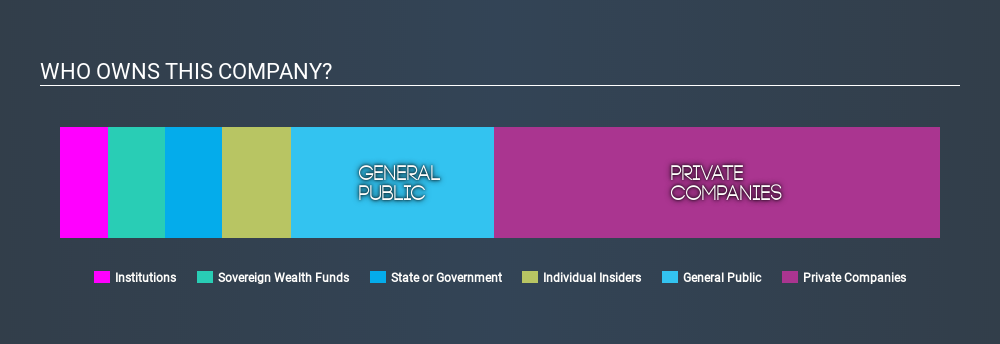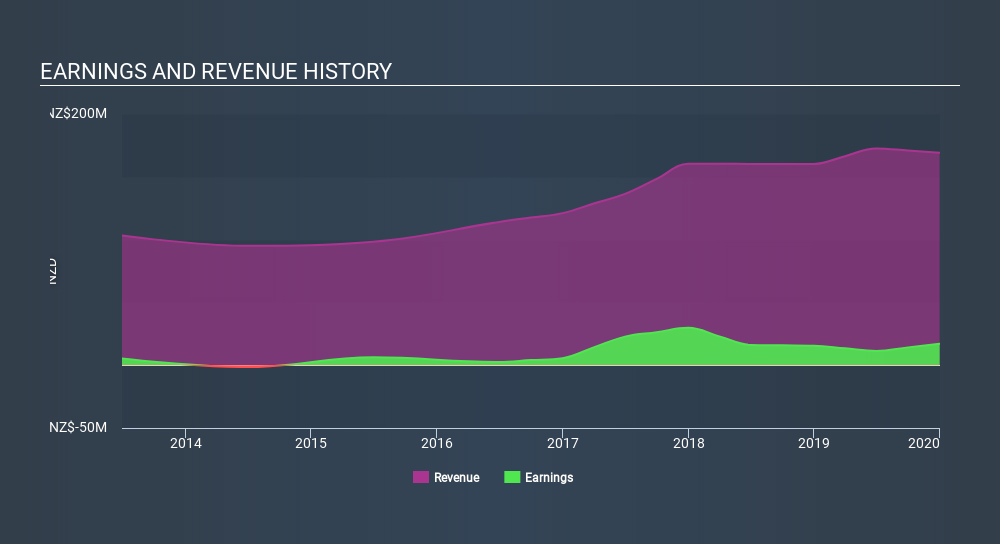- New Zealand
- /
- Food
- /
- NZSE:NZK
What Kind Of Investor Owns Most Of New Zealand King Salmon Investments Limited (NZSE:NZK)?

Every investor in New Zealand King Salmon Investments Limited (NZSE:NZK) should be aware of the most powerful shareholder groups. Insiders often own a large chunk of younger, smaller, companies while huge companies tend to have institutions as shareholders. I generally like to see some degree of insider ownership, even if only a little. As Nassim Nicholas Taleb said, 'Don’t tell me what you think, tell me what you have in your portfolio.
With a market capitalization of NZ$275m, New Zealand King Salmon Investments is a small cap stock, so it might not be well known by many institutional investors. Taking a look at our data on the ownership groups (below), it's seems that institutional investors have bought into the company. Let's delve deeper into each type of owner, to discover more about New Zealand King Salmon Investments.
Check out our latest analysis for New Zealand King Salmon Investments

What Does The Institutional Ownership Tell Us About New Zealand King Salmon Investments?
Institutions typically measure themselves against a benchmark when reporting to their own investors, so they often become more enthusiastic about a stock once it's included in a major index. We would expect most companies to have some institutions on the register, especially if they are growing.
As you can see, institutional investors own 5.6% of New Zealand King Salmon Investments. This suggests some credibility amongst professional investors. But we can't rely on that fact alone, since institutions make bad investments sometimes, just like everyone does. If multiple institutions change their view on a stock at the same time, you could see the share price drop fast. It's therefore worth looking at New Zealand King Salmon Investments's earnings history, below. Of course, the future is what really matters.

We note that hedge funds don't have a meaningful investment in New Zealand King Salmon Investments. Looking at our data, we can see that the largest shareholder is Oregon Group Limited with 40% of shares outstanding. China Resources Company Limited is the second largest shareholder with 9.9% of common stock, followed by New Zealand Superannuation Fund, holding 6.4% of the stock.
Our analysis suggests that the top 3 shareholders collectively control 56% of the company's shares, implying that they have considerable power to influence the company's decisions.
While studying institutional ownership for a company can add value to your research, it is also a good practice to research analyst recommendations to get a deeper understand of a stock's expected performance. There are plenty of analysts covering the stock, so it might be worth seeing what they are forecasting, too.
Insider Ownership Of New Zealand King Salmon Investments
The definition of an insider can differ slightly between different countries, but members of the board of directors always count. The company management answer to the board; and the latter should represent the interests of shareholders. Notably, sometimes top-level managers are on the board, themselves.
Insider ownership is positive when it signals leadership are thinking like the true owners of the company. However, high insider ownership can also give immense power to a small group within the company. This can be negative in some circumstances.
Our most recent data indicates that insiders own some shares in New Zealand King Salmon Investments Limited. As individuals, the insiders collectively own NZ$22m worth of the NZ$275m company. Some would say this shows alignment of interests between shareholders and the board, though I generally prefer to see bigger insider holdings. But it might be worth checking if those insiders have been selling.
General Public Ownership
With a 23% ownership, the general public have some degree of sway over NZK. While this size of ownership may not be enough to sway a policy decision in their favour, they can still make a collective impact on company policies.
Private Company Ownership
We can see that Private Companies own 51%, of the shares on issue. It's hard to draw any conclusions from this fact alone, so its worth looking into who owns those private companies. Sometimes insiders or other related parties have an interest in shares in a public company through a separate private company.
Next Steps:
It's always worth thinking about the different groups who own shares in a company. But to understand New Zealand King Salmon Investments better, we need to consider many other factors. For example, we've discovered 1 warning sign for New Zealand King Salmon Investments that you should be aware of before investing here.
But ultimately it is the future, not the past, that will determine how well the owners of this business will do. Therefore we think it advisable to take a look at this free report showing whether analysts are predicting a brighter future.
NB: Figures in this article are calculated using data from the last twelve months, which refer to the 12-month period ending on the last date of the month the financial statement is dated. This may not be consistent with full year annual report figures.
If you spot an error that warrants correction, please contact the editor at editorial-team@simplywallst.com. This article by Simply Wall St is general in nature. It does not constitute a recommendation to buy or sell any stock, and does not take account of your objectives, or your financial situation. Simply Wall St has no position in the stocks mentioned.
We aim to bring you long-term focused research analysis driven by fundamental data. Note that our analysis may not factor in the latest price-sensitive company announcements or qualitative material. Thank you for reading.
About NZSE:NZK
New Zealand King Salmon Investments
Engages in the farming, processing, and sale of salmon products in New Zealand, North America, Australia, Japan, Europe, China, and internationally.
Flawless balance sheet and fair value.
Similar Companies
Market Insights
Community Narratives



